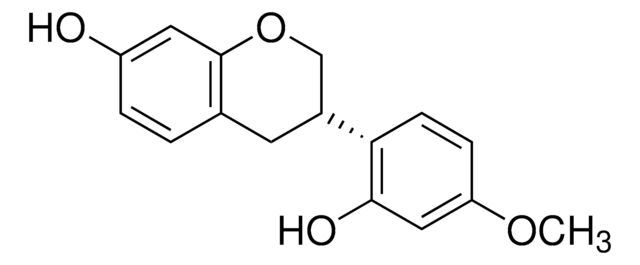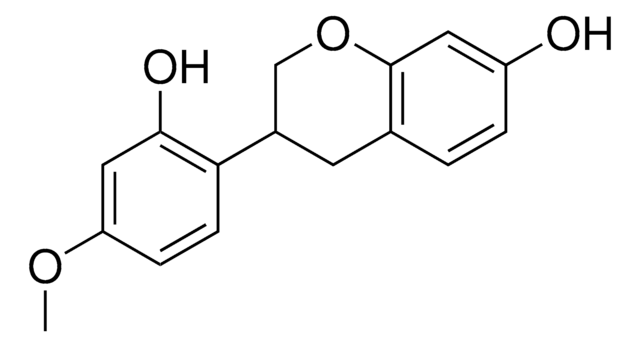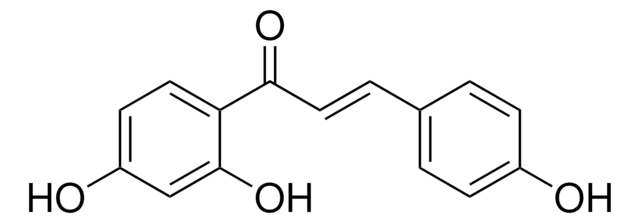SML3931
(-)-Vestitol
≥98% (HPLC)
Synonym(s):
(3R)-3,4-Dihydro-3-(2-hydroxy-4-methoxyphenyl)-2H-1-benzopyran-7-ol, (3R)-Vestitol, Vestitol
Sign Into View Organizational & Contract Pricing
All Photos(2)
About This Item
Empirical Formula (Hill Notation):
C16H16O4
CAS Number:
Molecular Weight:
272.30
MDL number:
UNSPSC Code:
51111800
UNSPSC Code:
12352200
NACRES:
NA.77
Recommended Products
Quality Level
Assay
≥98% (HPLC)
form
powder
color
white to beige
solubility
DMSO: 2 mg/mL, clear
storage temp.
-10 to -25°C
Biochem/physiol Actions
Hydroxyisoflavan isolated from Cuban and Brazilian red propolis that exhibits potent anti-inflammatory, anti-viral, and antiparasitic activities.
Vestitol is a hydroxyisoflavan isolated from Cuban and Brazilian red propolis, licorice root and other sources that exhibits potent anti-inflammatory, anti-viral, and antiparasitic activities. Apparently Vestitol inhibits release of the chemokines CXCL1/KC and CXCL2/MIP-2 from macrophages. Vestitol strongly inhibits Chikungunya virus infection. Vestitol exhibits anti-trypanosomal activity against T. brucei and T. congolense (EC50 3.86 and 4.36 µg/ml.
Vestitol is a hydroxyisoflavan isolated from Cuban and Brazilian red propolis, licorice root and other sources that exhibits potent anti-inflammatory, anti-viral, and antiparasitic activities. Apparently Vestitol inhibits release of the chemokines CXCL1/KC and CXCL2/MIP-2 from macrophages. Vestitol strongly inhibits Chikungunya virus infection. Vestitol exhibits anti-trypanosomal activity against T. brucei and T. congolense (EC50 3.86 and 4.36 µg/ml.
Storage Class Code
11 - Combustible Solids
WGK
WGK 3
Flash Point(F)
Not applicable
Flash Point(C)
Not applicable
Choose from one of the most recent versions:
Certificates of Analysis (COA)
Lot/Batch Number
Don't see the Right Version?
If you require a particular version, you can look up a specific certificate by the Lot or Batch number.
Already Own This Product?
Find documentation for the products that you have recently purchased in the Document Library.
The Activity of Red Nigerian Propolis and Some of Its Components against Trypanosoma brucei and Trypanosoma congolense
Molecules (Basel), 28(2), 622-622 (2023)
Potential in vitro anti-periodontopathogenic, anti-Chikungunya activities and in vivo toxicity of Brazilian red propolis
Scientific Reports, 12(1), 21165-21165 (2022)
Eun Ju Lee et al.
International journal of molecular sciences, 22(2) (2021-01-21)
Skeletal muscle is the most abundant tissue and constitutes about 40% of total body mass. Herein, we report that crude water extract (CWE) of G. uralensis enhanced myoblast proliferation and differentiation. Pretreatment of mice with the CWE of G. uralensis
Our team of scientists has experience in all areas of research including Life Science, Material Science, Chemical Synthesis, Chromatography, Analytical and many others.
Contact Technical Service








